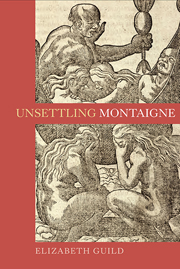Book contents
- Frontmatter
- Contents
- Acknowledgements
- Author's Note
- Abbreviations of Journal Titles
- Chronology
- Introduction
- 1 The Possibility of Their Being Otherwise
- 2 ‘Je ne vois le tout de rien’: The Cannibal and the Place of Knowledge
- 3 Cannibal, Beloved: On Eating What is Good …
- 4 Confessions: The Desire for Knowledge, the Passion for Ignorance
- 5 Tickling, Shaking, Shitting
- 6 The Place of the Brother
- 7 Uncertain Futures
- Bibliography
- Index
3 - Cannibal, Beloved: On Eating What is Good …
Published online by Cambridge University Press: 05 April 2014
- Frontmatter
- Contents
- Acknowledgements
- Author's Note
- Abbreviations of Journal Titles
- Chronology
- Introduction
- 1 The Possibility of Their Being Otherwise
- 2 ‘Je ne vois le tout de rien’: The Cannibal and the Place of Knowledge
- 3 Cannibal, Beloved: On Eating What is Good …
- 4 Confessions: The Desire for Knowledge, the Passion for Ignorance
- 5 Tickling, Shaking, Shitting
- 6 The Place of the Brother
- 7 Uncertain Futures
- Bibliography
- Index
Summary
C'est dans la demande orale que s'est creusé la place de … désir … La parole reste … le lieu de désir.
The inhumanity and injustice observed by the cannibal visitors to France, where the affluent were indifferent to the starvation surrounding them, were incomprehensible to them from the perspective of their own culture. They are also the antithesis of the ideal relationship between Montaigne and La Boétie memorialized in ‘De l'amitié’. In both cannibal culture and this ideal friendship-love, the other and the self are each other's ‘moitié’: ‘nous estions à moitié de tout’ (in all things we were halves) (p. 193), and in both chapters highly charged forms of hunger for the other are at the heart of the relationships described.
The metaphor of hunger seems to convey the essence of such idealized relationships – so long as it is predicated on perfect symmetry between the two eaters: ‘d'une faim, d'une concurrence pareille’ (with equal hunger and accord) (p. 189), and on each being each other's half. Other than in thus describing his relationship with La Boétie, let's remember, Montaigne had to explain the term: and with its absence goes a failure on the part of these ‘hommes pleins’ (men who had their fill) to give to eat to the other, both literally and figuratively. What it means, figuratively, to give to eat to the other, while at the same time being eaten by the other, or at least being willing to be, and why this was not possible except as an abstraction or a singular exception, are questions I shall explore now, extending the previous chapter's inquiries into subjectivity, sociality, knowledge and desire into analysis of the place of love and sacrifice in Montaigne's writing.
- Type
- Chapter
- Information
- Unsettling MontaignePoetics, Ethics and Affect in the Essais and Other Writings, pp. 73 - 118Publisher: Boydell & BrewerPrint publication year: 2014



